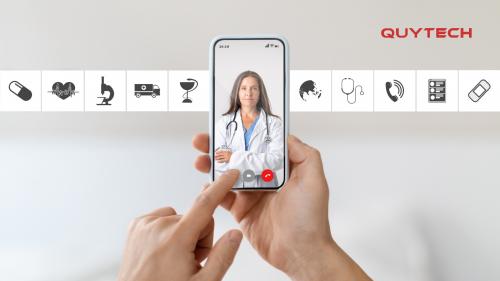Generative AI in Healthcare: Applications and Transformative Impact

The healthcare industry has seen a significant transformation with the integration of advanced technologies. Among these, Generative AI stands out as a revolutionary force, poised to redefine various aspects of medical practice and healthcare delivery.
This blog delves into the multifaceted applications of Generative AI in healthcare and explores its transformative impact on the industry.
Understanding Generative AI
Generative AI refers to a class of artificial intelligence systems that can generate new content, ranging from text and images to complex data structures, based on the patterns it has learned from existing data.
Unlike traditional AI models that are primarily designed for classification or regression tasks, Generative AI models, such as Generative Adversarial Networks (GANs) and Variational Autoencoders (VAEs), can create new, synthetic data that mimic real-world data.
Explore Now: Best Generative AI Development Company
Key Technologies Behind Generative AI
Generative Adversarial Networks (GANs): These consist of two neural networks, a generator and a discriminator, which work together to produce realistic data. The generator creates new data instances, while the discriminator evaluates them for authenticity.
Variational Autoencoders (VAEs): These models encode input data into a lower-dimensional space and then decode it back, generating new data points that resemble the original data.
Applications of Generative AI in Healthcare
Generative AI has a wide range of applications in healthcare, each promising to enhance the efficiency, accuracy, and personalization of medical services.
1. Medical Imaging
Medical imaging is one of the most significant areas where Generative AI is making a profound impact.
Technologies such as GANs are being used to generate high-resolution images from lower-quality inputs, enhance image clarity, and even create synthetic medical images for training purposes.
Enhancing Image Quality
Generative AI can improve the quality of medical images such as MRIs, CT scans, and X-rays. For instance, it can remove noise and artifacts from images, providing clearer and more accurate visuals that assist radiologists in diagnosis.
Synthetic Data Generation
Training machine learning models in healthcare often requires vast amounts of data, which can be scarce.
Generative AI can create synthetic medical images that closely resemble real patient data, aiding in the development and training of robust diagnostic models without compromising patient privacy.
2. Drug Discovery and Development
The process of drug discovery is time-consuming and costly.
Generative AI has the potential to revolutionize this process by predicting molecular structures and generating novel compounds.
Predictive Modeling
Generative models can predict the behavior of new drug compounds and their interactions with biological targets, significantly speeding up the initial phases of drug discovery.
Compound Generation
By generating new molecular structures, Generative AI helps in identifying potential drug candidates faster than traditional methods, reducing the time and cost associated with bringing new drugs to market.
3. Personalized Medicine
Personalized medicine aims to tailor medical treatment to individual characteristics, such as genetics and lifestyle.
Generative AI can play a crucial role in this field by analyzing patient data to create personalized treatment plans.
Genomic Data Analysis
Generative models can analyze large datasets of genomic information to identify patterns and mutations that may affect an individual’s response to certain treatments, leading to more personalized and effective healthcare solutions.
Custom Treatment Plans
Using patient-specific data, Generative AI can generate custom treatment plans that consider unique health profiles, improving the effectiveness of treatments and reducing the likelihood of adverse reactions.
4. Virtual Health Assistants
Generative AI powers advanced virtual health assistants that can provide medical advice, schedule appointments, and even offer mental health support through natural language processing and conversation generation.
Enhanced Patient Interaction
Virtual assistants equipped with Generative AI can engage in more meaningful and accurate interactions with patients, providing them with reliable health information and guidance.
Mental Health Support
AI-driven virtual therapists can offer cognitive behavioral therapy (CBT) and other forms of mental health support, making mental health care more accessible and personalized.
5. Clinical Decision Support
Generative AI can assist healthcare professionals in making better clinical decisions by generating insights from complex datasets and predicting patient outcomes.
Diagnostic Assistance
By analyzing patient records and medical literature, Generative AI can suggest potential diagnoses and treatment options, aiding doctors in making more informed decisions.
Predictive Analytics
Generative AI models can predict patient outcomes based on historical data, helping healthcare providers anticipate complications and plan preventive measures.
Transformative Impact of Generative AI in Healthcare
The integration of Generative AI in healthcare is driving transformative changes across the industry, impacting patient care, operational efficiency, and the overall quality of medical services.
Improved Patient Outcomes
Generative AI's ability to enhance diagnostic accuracy and personalize treatments leads to better patient outcomes.
Early and accurate diagnosis, coupled with tailored treatment plans, significantly improves the chances of successful recovery and management of chronic conditions.
Increased Efficiency
By automating routine tasks and generating valuable insights from complex data, Generative AI allows healthcare professionals to focus more on patient care.
This increased efficiency can lead to shorter hospital stays, quicker diagnosis, and faster treatment initiation.
Cost Reduction
The automation and optimization brought by Generative AI can reduce operational costs in healthcare.
For example, by accelerating drug discovery processes and enhancing diagnostic procedures, healthcare providers can save significant amounts of time and resources.
Enhanced Research and Development
Generative AI provides researchers with powerful tools to explore new medical hypotheses, simulate clinical trials, and generate synthetic data for study, thereby accelerating the pace of medical research and innovation.
Challenges and Future Directions
Despite its immense potential, the adoption of Generative AI in healthcare comes with challenges that need to be addressed.
Data Privacy and Security
The use of patient data in AI models raises concerns about privacy and security. Ensuring that Generative AI systems comply with regulations like HIPAA (Health Insurance Portability and Accountability Act) is crucial to protect patient information.
Ethical Considerations
The generation of synthetic data and the automation of clinical decision-making pose ethical questions. It is important to establish guidelines and frameworks to ensure that AI-driven healthcare solutions are used responsibly and transparently.
Integration with Existing Systems
Integrating Generative AI into existing healthcare infrastructures can be complex. Ensuring interoperability and seamless integration with current electronic health records (EHR) systems and other medical technologies is vital for successful implementation.
Ongoing Training and Adaptation
Generative AI models require continuous training and adaptation to remain effective. The dynamic nature of medical data means that these models must be regularly updated to reflect new research findings and clinical practices.
Conclusion
Generative AI is set to transform the healthcare industry by enhancing medical imaging, accelerating drug discovery, enabling personalized medicine, supporting virtual health assistants, and aiding in clinical decision-making.
Despite the challenges, the potential benefits of integrating Generative AI in healthcare are immense, promising improved patient outcomes, increased efficiency, cost reduction, and enhanced research capabilities. As the technology continues to evolve, partnering with an AI development company that specializes in artificial intelligence in healthcare can help healthcare providers leverage these advancements to their fullest potential.
By addressing the challenges and embracing the transformative power of Generative AI, the healthcare industry can usher in a new era of innovation and improved patient care.
Contact us to learn more about how we can help you with your AI development projects.








Comments